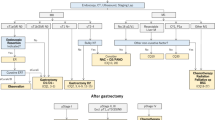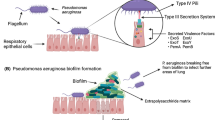Abstract
Since the discovery of Helicobacter pylori in the early 1980s several treatment regimens have been developed to effectively treat this infection. International guidelines have allowed consensus on the best management and improved eradication rates. In recent years increasing antimicrobial resistance and falling eradication rates highlight the need for updated guidelines. In this article we review the most recent European management guidelines and in view of the unavailability of some drugs consider new treatment regimens for the management of H. pylori in Ireland.

Similar content being viewed by others
References
Marshall BJ, Warren JR (1983) Unidentified curved bacilli on gastric epithelium in active chronic gastritis. Lancet 1(8336):1273–1275
Coghlan JG, Gilligan D, Humphries H et al (1987) Campylobacter pylori and recurrence of duodenal ulcers—a 12-month follow-up study. Lancet 2(8568):1109–1111
Malfertheiner P, Megraud F, O’Morain C et al (2007) Current concepts in the management of Helicobacter pylori infection: the Maastricht III consensus report. Gut 56(6):772–781
Lee JM, Deasy E, O’Morain CA (2000) Helicobacter pylori eradication therapy: a discrepancy between current guidelines and clinical practice. Eur J Gastroenterol Hepatol 12(4):433–437
Chiba N, Veldhuyzen Van Zanten SJO et al (2002) Treating Helicobacter pylori infection in primary care patients with uninvestigated dyspepsia: the Canadian adult dyspepsia empiric treatment-Helicobacter pylori positive (CADET-Hp) randomised controlled trial. BMJ 324(7344):1012–1016
Franchini M, Veneri D (2004) Helicobacter pylori infection and immune thrombocytopenic purpura: an update. Helicobacter 9:342–346
Huang JQ, Sridhar S, Hunt RH (2002) Role of Helicobacter pylori infection and non-steroidal anti-inflammatory drugs in peptic-ulcer disease: a meta-analysis. Lancet 359:14–22
Gisbert JP, Pajares JM (2004) Review article: C-urea breath test in the diagnosis of Helicobacter pylori infection—a critical review. Aliment Pharmacol Ther 20:1001–1017
Rogge JD, Wagner DR, Carrico RJ et al (1995) Evaluation of a new urease reagent strip for detection of Helicobacter pylori in gastric biopsy specimens. Am J Gastroenterol 90:1965–1968
Egan BJ, Ryan BM, O’Morain CA Test, treat and confirm eradication. BMJ online 13/2/07
Saleem A, Dobson M, Thornton O, O’Connor HJ, O’Morain CA ISG. Poster presentation 2006
Correa P (1992) Human gastric carcinogenesis: a multistep and multifactorial process—first American Cancer Society Award Lecture on cancer epidemiology and prevention. Cancer Res 52(24):6735–6740
Cheung TK, Wong BC (2008) Treatment of Helicobacter pylori and prevention of gastric cancer. J Dig Dis 9(1):8–13
Laheij R (2006) Is community treatment of H. pylori feasible?. United European Gastroenterology Week, Berlin
Fischbach L, Evans EL (2007) Meta-analysis: the effect of antibiotic resistance status on the efficacy of triple and quadruple first-line therapies for Helicobacter pylori. Aliment Pharmacol Ther 26(3):343–357
Hooton C, Dempsey C, Keohane J et al (2006) Helicobacter pylori: prevalence of antimicrobial resistance in clinical isolates. Br J Biomed Sci 63(3):113–116
Ford A, Moayyedi P (2003) How can the current strategies for Helicobacter pylori eradication therapy be improved? Can J Gastroenterol 17(Suppl B):36B–40B
Egan BJ, Katicic M, O’Connor HJ, O’Morain CA (2007) Treatment of Helicobacter pylori. Helicobacter 12(Suppl 1):31–37
Lesbros-Pantoflickova D, Corthésy-Theulaz I, Blum AL (2007) Helicobacter pylori and probiotics. J Nutr 137(3 Suppl 2):812S–818S
De Bortoli N, Leonardi G, Ciancia E et al (2007) Helicobacter pylori eradication: a randomized prospective study of triple therapy versus triple therapy plus lactoferrin and probiotics. Am J Gastroenterol 102(5):951–956
Cremonini F, Di Caro S, Covino M et al (2002) Effect of different probiotic preparations on anti-helicobacter pylori therapy-related side effects: a parallel group, triple blind, placebo-controlled study. Am J Gastroenterol 97(11):2744–2749
Uygun A, Ozel AM, Yildiz O et al (2008) J Gastroenterol Hepatol. Comparison of three different second-line quadruple therapies including bismuth subcitrate in Turkish patients with non-ulcer dyspepsia who failed to eradicate Helicobacter pylori with a 14-day standard first-line therapy. J Gastroenterol Hepatol 23(1):42–45
Gisbert JP, De la Morena F (2006) Systematic review and meta-analysis: levofloxacin-based rescue regimens after Helicobacter pylori treatment failure. Aliment Pharmacol Ther 23(1):35–44
Gisbert JP, Bermejo F, Castro-Fernández M et al (2008) H. pylori study group of the Asociación Española de Gastroenterología. Second-line rescue therapy with levofloxacin after H. pylori treatment failure: a Spanish multicenter study of 300 patients. Am J Gastroenterol 103(1):71–76
Van der Poorten D, Katelaris PH (2007) The effectiveness of rifabutin triple therapy for patients with difficult-to-eradicate Helicobacter pylori in clinical practice. Aliment Pharmacol Ther 26(11–12):1537–1542
Miehlke S, Schneider-Brachert W, Kirsch C et al (2008) One-week once-daily triple therapy with esomeprazole, moxifloxacin, and rifabutin for eradication of persistent Helicobacter pylori resistant to both metronidazole and clarithromycin. Helicobacter 13(1):69–74
Gisbert JP, Gisbert JL, Marcos S et al (2008) Empirical rescue therapy after Helicobacter pylori treatment failure: a 10-year single-centre study of 500 patients. Aliment Pharmacol Ther 27(4):346–354
Author information
Authors and Affiliations
Corresponding author
Rights and permissions
About this article
Cite this article
Egan, B.J., O’Connor, H.J. & O’Morain, C.A. What is new in the management of Helicobacter pylori?. Ir J Med Sci 177, 185–188 (2008). https://doi.org/10.1007/s11845-008-0173-8
Received:
Accepted:
Published:
Issue Date:
DOI: https://doi.org/10.1007/s11845-008-0173-8




